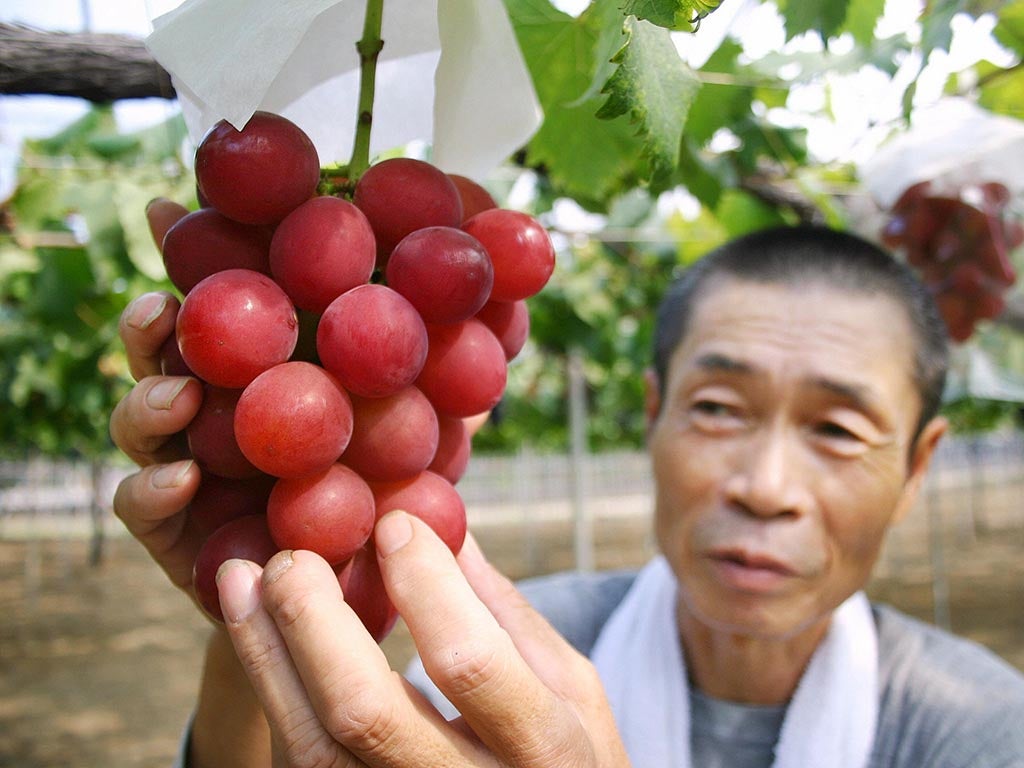Why is fruit so expensive in Japan?
The value of Ruby Roman grapes has rocketed since they were first put on the market in 2008 - when they were a snip at just ¥100,000 (£573)

Your support helps us to tell the story
From reproductive rights to climate change to Big Tech, The Independent is on the ground when the story is developing. Whether it's investigating the financials of Elon Musk's pro-Trump PAC or producing our latest documentary, 'The A Word', which shines a light on the American women fighting for reproductive rights, we know how important it is to parse out the facts from the messaging.
At such a critical moment in US history, we need reporters on the ground. Your donation allows us to keep sending journalists to speak to both sides of the story.
The Independent is trusted by Americans across the entire political spectrum. And unlike many other quality news outlets, we choose not to lock Americans out of our reporting and analysis with paywalls. We believe quality journalism should be available to everyone, paid for by those who can afford it.
Your support makes all the difference.How much would you pay for a bunch of grapes? Even the most seasoned fruit connoisseurs among us would usually agree that £3,170 is a bit steep.
Not so, though, for the wealthy wedding hall owner who presented one fortunate couple with a ¥550,000 bunch of Ruby Roman grapes, bought at auction, as a wedding gift in Ishikawa this month.
It's not uncommon to give gifts of fruit in Japan; unlike in the UK, fruit is considered a luxury product, and features heavily in Japan's gift-giving culture, along with other gourmet foodstuffs including frozen steaks, whisky and black tea.
Gifts are presented not only on special occasions, but as part of a reciprocal tradition to show appreciation, extend courtesy and build relationships. Rarely would anyone turn up at a friend's house empty-handed, and the exchange is an intrinsic part of business relationships.
Of course, such extravagant spending is rare, but it's not unheard of. Some 16,000 bunches of Ruby Romans have been sold in this season alone, and their value has rocketed since they were first put on the market in 2008 - when they were a snip at just ¥100,000 (£573).
Then there's the rare Densuke watermelon - three years ago, farmers were lamenting a sudden price drop when the first perfectly formed, glossy black gourd of the season was auctioned off at "only" £1,750.
Even the fruit you see every day in convenience stores is, as a rule, far from cheap, but these gift fruits are in an entirely different league. They must be impeccably sculpted and utterly flawless, beautifully packaged and protected from any potential damage.
There are entire luxury grocer's dedicated to gift fruit, the most famous of which is Senbikiya, whose owners credit themselves in no small way with beginning the tradition of giving fruit as gifts. The shop - somewhat unbelievably - began as a 'fruit discount shop' in 1834, before it began selling imported fruit in 1867. Twenty years and a fairly drastic rebrand later, it opened up Japan's first 'fruit cafe' selling imported fruits and high-grade domestic produce. Since then it has built up an empire that spans the country, making it the nation's largest luxury fruit provider.
There you'll find £12 apples; wooden boxes of 12 strawberries, each lovingly encased in a satin padding, for nearly £40; and sumptuous-looking gift medleys priced at £97, each item meticulously protected with tissue paper and foam padding. Then there's the 'king of fruit', the musk melon, wrapped in a ribbon and set on a special stand with soft lighting, for more than £100 apiece - here a mere pittance compared to the most expensive on record, sold at a whopping £14,000 for a pair.
And it's not just perfect but otherwise ordinary specimens that are available - most well known are the now-infamous square watermelons that are now selling in Vancouver for $200 apiece, but Japan's novelty-shaped fruit market has grown to include pyramid- and heart-shaped watermelons and pentagonal oranges.
Though it might be tempting to say that looks are everything, it goes without saying that the taste must live up to the faultless presentation. In other words, if you're ever in the extraordinary position of being presented with a £200 bunch of grapes, savour each one - they're probably the best grapes you'll ever have.
The pricing reflects the extraordinary measures growers go to to cultivate the fruits. Melons are grown in only a few areas deemed to give the optimal growing climate, nestled in soil beds that are checked regularly to ensure prime moisture levels and housed in temperature-regulated greenhouses. Excess fruit is stripped away to allow only the best to thrive - often just one to a vine - which further adds to their value. Part of the value of the Densuke watermelons comes from their rarity as well as their quality: they're grown exclusively in Hokkaido, and only around 100 are available when auctions open each year.
Sekai ichi - world's best - apples, which go for around £15 each, are individually pollinated by hand: an endeavour that would best be described as a labour of love were it not for the hefty financial reward.
As the saying goes, you get what you pay for. £100 grape, anyone?
Join our commenting forum
Join thought-provoking conversations, follow other Independent readers and see their replies
Comments